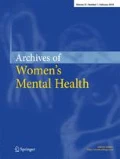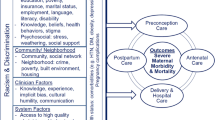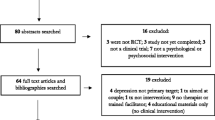Abstract
In this study, we evaluated the association between prenatal depression symptoms adverse birth outcomes in African–American women. We conducted a retrospective cohort study of 261 pregnant African–American women who were screened with the Edinburgh Postnatal Depression Scale (EPDS) at their initial prenatal visit. Medical records were reviewed to assess pregnancy and neonatal outcomes, specifically preeclampsia, preterm birth, intrauterine growth retardation, and low birth weight. Using multivariable logistic regression models, an EPDS score ≥10 was associated with increased risk for preeclampsia, preterm birth, and low birth weight. An EPDS score ≥10 was associated with increased risk for intrauterine growth retardation, but after controlling for behavioral risk factors, this association was no longer significant. Patients who screen positive for depression symptoms during pregnancy are at increased risk for multiple adverse birth outcomes. In a positive, patient-rated depression screening at the initial obstetrics visit, depression is associated with increased risk for multiple adverse birth outcomes. Given the retrospective study design and small sample size, these findings should be confirmed in a prospective cohort study.
Similar content being viewed by others
References
Andersson L, Sundström-Poromaa I, Wulff M, Aström M, Bixo M (2004) Implications of antenatal depression and anxiety for obstetric outcome. Obstet Gynecol 104(3):467–476
Bonari L, Pinto N, Ahn E, Einarson A, Steiner M, Koren G (2004) Perinatal risks of untreated depression during pregnancy. Can J Psychiatry 49:726–735
Chen CH, Lin HC (2011) Prenatal care and adverse pregnancy outcomes among women with depression: a nationwide population-based study. Can J Psychiatry 56:273–280
Cox JL, Chapman G, Murray D, Jones P (1996) Validation of the Edinburgh postnatal depression scale (EPDS) in non-postnatal women. J Affect Disord 39:185–189
Cripe SM, Frederick IO, Qiu C, Williams MA (2011) Risk of preterm delivery and hypertensive disorders of pregnancy in relation to maternal co-morbid mood and migraine disorders during pregnancy. Paediatr Perinat Epidemiol 25(2):116–123
De Bonis M, Torricelli M, Severi FM, Luisi S, De Leo V, Petraglia F (2012) Neuroendocrine aspects of placenta and pregnancy. Gynecol Endocrinol 28(Suppl 1):22–26
Diego MA, Field T, Hernandez-Reif M, Schanberg S, Kuhn C, Gonzalez-Quintero VH (2009) Prenatal depression restricts fetal growth. Early Hum Dev 85:65–70
Evins GG, Theofrastous JP, Galvin SL (2000) Postpartum depression: a comparison of screening and routine clinical evaluation. Am J Obstet Gynecol 182:1080–1082
Field T, Diego M, Hernandez-Reif M, Deeds O, Holder V, Schanberg S et al (2009) Depressed pregnant black women have a greater incidence of prematurity and low birthweight outcomes. Infant Behav Dev 32:10–16
Gavin NI, Gaynes BN, Lohr KN, Meltzer-Brody S, Gartlehner G, Swinson T (2005) Perinatal depression: a systematic review of prevalence and incidence. Obstet Gynecol 106:1071–1083
Goedhart G, Snijders AC, Hesselink AE, van Poppel MN, Bonsel GJ, Vrijkotte TG (2010) Maternal depressive symptoms in relation to perinatal mortality and morbidity: results from a large multiethnic cohort study. Psychosom Med 72:769–776
Grote NK, Bridge JA, Gavin AR, Melville JL, Iyengar S, Katon WJ (2010) A meta-analysis of depression during pregnancy and the risk of preterm birth, low birth weight, and intrauterine growth restriction. Arch Gen Psychiatry 67:1012–1024
Herrara JA, Alvarado JP, Martinez JE (1998) The psychosocial environment and cellular immunity in the pregnant patient. Stress Med 4:49–56
Holzman C, Bullen B, Fisher R, Paneth N, Reuss L, Prematurity Study Group (2001) Pregnancy outcomes and community health: the POUCH study of preterm delivery. Paediatr Perinat Epidemiol 15:136–158
Hurley KM, Caulfield LE, Sacco LM, Costigan KA, Dipietro JA (2005) Psychosocial influences in dietary patterns during pregnancy. J Am Diet Assoc 105:963–966
Jardri R, Pelta J, Maron M, Thomas P, Delion P, Codaccioni X et al (2006) Predictive validation study of the Edinburgh postnatal depression scale in the first week after delivery and risk analysis for postnatal depression. J Affect Disord 93:169–176
Kammerer M, Taylor A, Glover V (2006) The HPA axis and perinatal depression: a hypothesis. Arch Womens Ment Health 9:187–196
Kanasaki K, Kalluri R (2009) The biology of preeclampsia. Kidney Int 76(8):831–837
Kharaghani R, Geranmaye M, Janani L, Hantooshzade S, Arbabi M, Rahmani Bilandi R, Bagheri F (2012) Preeclampsia and depression: a case–control study in Tehran. Arch Gynecol Obstet 286(1):249–253
Kiely M, El-Mohandes AA, Gantz MG, Chowdhury D, Thornberry JS, El-Khorazaty MN (2011) Understanding the association of biomedical, psychosocial and behavioral risks with adverse pregnancy outcomes among African-Americans in Washington, DC. Matern Child Health J 15:S85–S95
Kim DR, Sockol L, Barber JP, Moseley M, Lamprou L, Rickels K, O’Reardon JP, Epperson CN (2011) A survey of patient acceptability of repetitive transcranial magnetic stimulation (TMS) during pregnancy. J Affect Disord 129(1–3):385–390
Kurki T, Hiilesmaa V, Raitasalo R, Mattila H, Ylikorkala O (2000) Depression and anxiety in early pregnancy and risk for preeclampsia. Obstet Gynecol 95:487–489
Lee DT, Yip AS, Chiu HF, Leung TY, Chung TK (2001) Screening for postnatal depression: are specific instruments mandatory? J Affect Disord 63:233–238
Magiakou MA, Mastorakos G, Webster E, Chrousos GP (1997) The hypothalamic-pituitary-adrenal axis and the female reproductive system. Ann N Y Acad Sci 816:42–56
Maguire J, Ferando I, Simonsen C, Mody I (2009) Excitability changes related to GABAA receptor plasticity during pregnancy. J Neurosci 29:9592–9601
Marcus SM (2008) Depression during pregnancy: rates, risks and consequences—Motherisk Update. Can J Clin Pharmacol 16:e15–e22
Marcus SM, Flynn HA, Blow F, Barry K (2005) A screening study of antidepressant treatment rates and mood symptoms in pregnancy. Arch Womens Ment Health 8:25–27
Newton ER, Piper JM, Shain RN, Perdue ST, Peairs W (2001) Predictors of the vaginal microflora. Am J Obstet Gynecol 184:845,53, discussion 853–5
Palmsten K, Setoguchi S, Margulis AV, Patrick AR, Hernández-Díaz S (2012) Elevated risk of preeclampsia in pregnant women with depression: depression or antidepressants? Am J Epidemiol 175:988–997
Qiu C, Williams MA, Calderon-Margalit R, Cripe SM, Sorensen TK (2009) Preeclampsia risk in relation to maternal mood and anxiety disorders diagnosed before or during early pregnancy. Am J Hypertens 22(4):397–402
Scholle SH, Haskett RF, Hanusa BH, Pincus HA, Kupfer DJ (2003) Addressing depression in obstetrics/gynecology practice. Gen Hosp Psychiatry 25:83–90
Smith MV, Shao L, Howell H, Lin H, Yonkers KA (2011) Perinatal depression and birth outcomes in a healthy start project. Matern Child Health J 15:401–409
Steiner M, Dunn E, Born L (2003) Hormones and mood: from menarche to menopause and beyond. J Affect Disord 74:67–83
Straub H, Adams M, Kim JJ, Silver RK (2012) Antenatal depressive symptoms increase the likelihood of preterm birth. Am J Obstet Gynecol 207(4):329
Udechuku A, Nguyen T, Hill R, Szego K (2010) Antidepressants in pregnancy: a systematic review. Aust N Z J Psychiatry 44:978–996
Van Dijk AE, Van Eijsden M, Stronks K, Gemke RJ, Vrijkotte TG (2010) Maternal depressive symptoms, serum folate status, and pregnancy outcome: results of the Amsterdam born children and their development study. Am J Obstet Gynecol 203:563.e1–563.e7
Vollebregt KC, van der Wal MF, Wolf H, Vrijkotte TG, Boer K, Bonsel GJ (2008) Is psychosocial stress in first ongoing pregnancies associated with pre-eclampsia and gestational hypertension? BJOG 115(5):607–615
Wadhwa PD, Culhane JF, Rauh V, Barve SS (2001) Stress and preterm birth: neuroendocrine, immune/inflammatory, and vascular mechanisms. Matern Child Health J 5:119–125
Wadhwa PD, Garite TJ, Porto M, Glynn L, Chicz-DeMet A, Dunkel-Schetter C, Sandman CA (2004) Placental corticotropin-releasing hormone (CRH), spontaneous preterm birth, and fetal growth restriction: a prospective investigation. Am J Obstet Gynecol 191(4):1063–1069
Wang SY, Chen CH (2010) The association between prenatal depression and obstetric outcome in Taiwan: a prospective study. J Womens Health (Larchmt) 19:2247–2251
Acknowledgments
The authors would like to thank Lisa Lamprou (CRC) and Claudia Schinstine (CRC) for their contribution to data collection
Author information
Authors and Affiliations
Corresponding author
Additional information
This research was support by grants from the National Institute of Mental Health (NIMH) (K23 MH092399-03; DRK) and (P50 MH099910; DRK, CNE, MDS) and the National Institute on Drug Abuse (NIDA) (K24 DA030301; CNE).
Rights and permissions
About this article
Cite this article
Kim, D.R., Sockol, L.E., Sammel, M.D. et al. Elevated risk of adverse obstetric outcomes in pregnant women with depression. Arch Womens Ment Health 16, 475–482 (2013). https://doi.org/10.1007/s00737-013-0371-x
Received:
Accepted:
Published:
Issue Date:
DOI: https://doi.org/10.1007/s00737-013-0371-x




